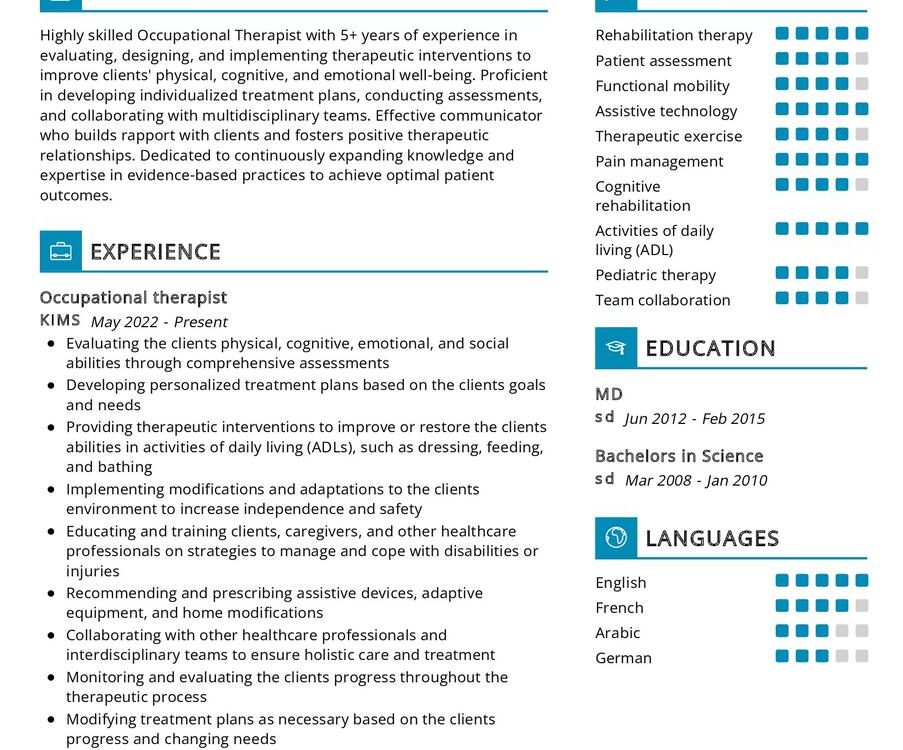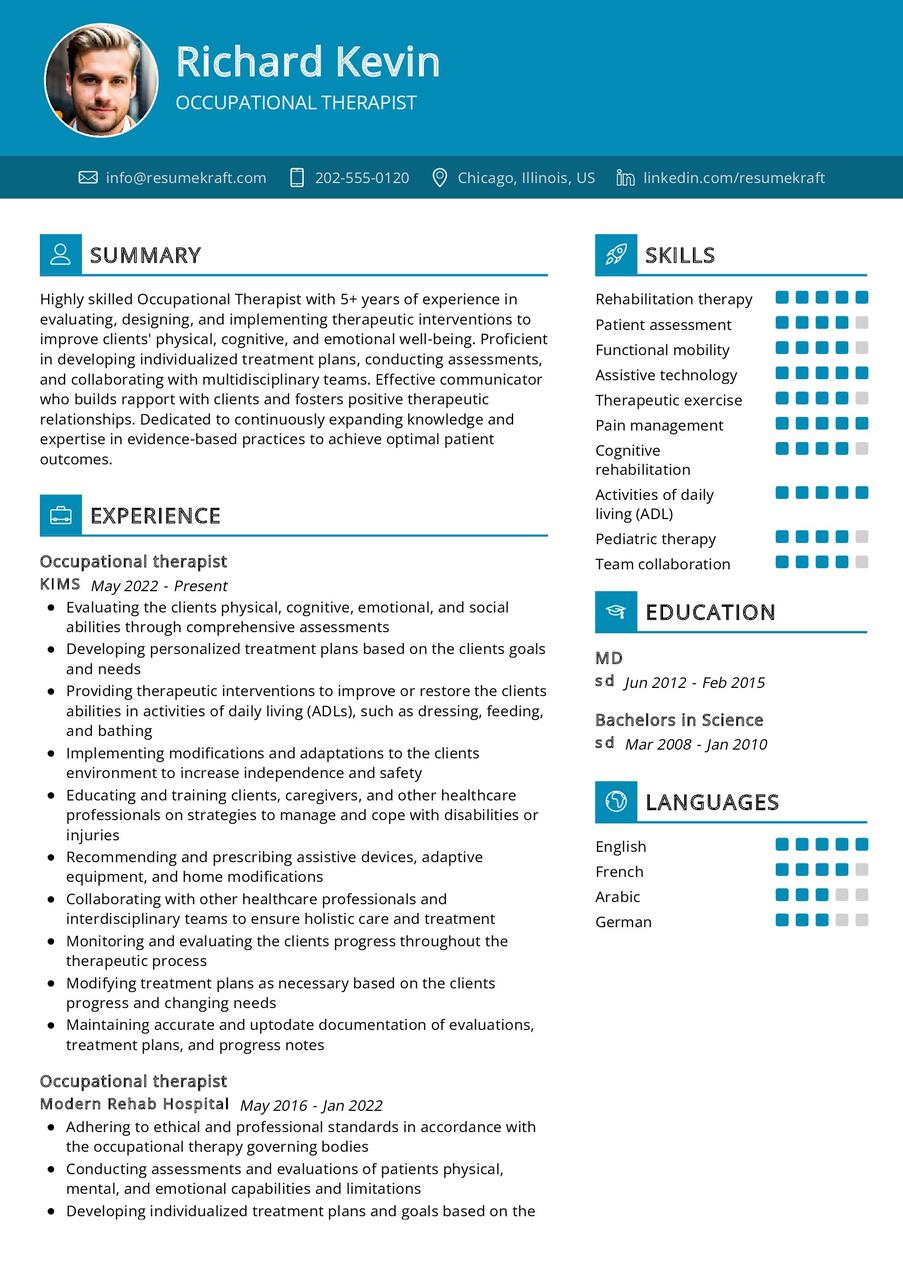Understanding the Role of an Occupational Therapist
Occupational therapy plays a crucial role in enhancing the lives of individuals facing physical, mental, or developmental challenges. As an Occupational Therapist, you become a catalyst for positive change, helping people regain independence in their daily lives. This article explores the multifaceted role of an Occupational Therapist, the necessary qualifications, job requirements, responsibilities, and provides insights on crafting an effective Occupational Therapist resume.
Occupational Therapist Job Requirements
Becoming an Occupational Therapist involves meeting specific requirements that showcase a combination of compassion, empathy, and professional skills. Let’s delve into the prerequisites needed to embark on this fulfilling career path:
- A Bachelor’s or Master’s degree in Occupational Therapy, demonstrating a solid foundation in the field.
- Knowledge of various therapeutic techniques and interventions, acquired through academic studies and practical experience.
- Clinical experience in occupational therapy, illustrating a hands-on understanding of patient care.
- Excellent communication and interpersonal skills, crucial for building rapport with patients and collaborating with healthcare professionals.
- Strong problem-solving abilities, enabling you to create tailored therapy plans for diverse patient needs.
- Adaptability and resilience, vital traits for navigating the dynamic healthcare environment.
Securing additional certifications or specialization in areas such as pediatric occupational therapy or mental health can further enhance your profile.
Responsibilities of an Occupational Therapist
The role of an Occupational Therapist is both challenging and rewarding, encompassing a variety of responsibilities aimed at improving the quality of life for individuals under their care. Let’s explore the key responsibilities that define this impactful profession:
- Conducting thorough assessments of patients to identify physical, cognitive, or emotional challenges.
- Developing personalized treatment plans tailored to each patient’s specific needs and goals.
- Implementing therapeutic interventions, including exercises, activities, and adaptive equipment, to promote independence.
- Collaborating with healthcare teams to ensure a holistic approach to patient care.
- Providing education and guidance to patients and their families on effective strategies for daily living.
- Documenting and evaluating patient progress, adjusting treatment plans as necessary.
- Staying updated on the latest advancements in occupational therapy and incorporating evidence-based practices into your work.
Each responsibility requires a blend of clinical expertise, empathy, and creativity to make a positive impact on the lives of those you serve.
Crafting an Effective Occupational Therapist Resume
Your resume serves as a reflection of your skills, experiences, and commitment to enhancing the well-being of others. Here are some tips to create a compelling Occupational Therapist resume:
- Highlight your clinical experience, emphasizing specific achievements and positive outcomes in patient care.
- Showcase your ability to create personalized treatment plans, detailing successful interventions and patient progress.
- Include measurable outcomes, such as improved patient mobility or increased independence, to quantify your impact.
- List relevant certifications and specializations, demonstrating your commitment to continuous learning and professional development.
- Customize your resume for each job application, aligning your skills and experiences with the specific requirements of the position.
Your resume is not just a document; it is a testament to your dedication to making a difference in the lives of those you serve as an Occupational Therapist.
Occupational Therapist Resume Summary Examples
Your resume summary is the gateway to your professional journey, offering a snapshot of your skills and experiences. Here are some examples to inspire your Occupational Therapist resume summary:
- “Compassionate Occupational Therapist with a proven track record in pediatric care, specializing in creating innovative therapy plans for children with developmental challenges.”
- “Experienced Occupational Therapist dedicated to empowering individuals with disabilities through personalized interventions, fostering independence and improving overall quality of life.”
- “Motivated Occupational Therapist with expertise in mental health, adept at designing and implementing therapeutic strategies to support individuals in their journey towards mental wellness.”
Your summary sets the tone for your resume, capturing the essence of your skills and passion for occupational therapy.
Experience Section for Your Occupational Therapist Resume
Your experience section is the heart of your resume, narrating the impactful stories of your career. Here are examples to guide you in showcasing your occupational therapy journey:
- “Led a team in a rehabilitation center, contributing to a 15% improvement in patient mobility and functionality.”
- “Implemented a sensory integration program for children, resulting in enhanced developmental skills and improved overall well-being.”
- “Collaborated with interdisciplinary teams to coordinate comprehensive care plans, ensuring a holistic approach to patient rehabilitation.”
Each experience shared adds depth to your resume, illustrating your contributions to the field of occupational therapy.
Education Section for Your Occupational Therapist Resume
Your educational background is the foundation of your expertise. Showcase your academic achievements with clarity:
- Master of Science in Occupational Therapy, XYZ University, 2016.
- Bachelor of Science in Health Science, ABC University, 2014.
- Occupational Therapy Board Certification, [Certification Body], 2017.
Your education section affirms your commitment to professional development and attaining the necessary qualifications in the field.
Occupational Therapist Skills for Your Resume
Your skill set is a toolkit that empowers you to make a positive impact on the lives of your patients. Here are essential skills for an Occupational Therapist:
Soft Skills:
- Empathy and compassion, fostering a supportive therapeutic relationship with patients.
- Effective communication, facilitating collaboration with patients, families, and healthcare teams.
- Adaptability, thriving in dynamic healthcare settings and adjusting to the unique needs of each patient.
- Problem-solving, finding innovative solutions to address the challenges faced by individuals under your care.
- Patience and resilience, maintaining a positive attitude in the face of setbacks and challenges.
Hard Skills:
- Knowledge of various therapeutic techniques, applying evidence-based practices in your interventions.
- Assessment and evaluation skills, conducting thorough analyses to identify patient needs and goals.
- Proficiency in using therapeutic equipment and tools to enhance patient outcomes.
- Documentation and record-keeping, maintaining accurate and comprehensive patient records.
- Collaboration and teamwork, working seamlessly with healthcare professionals to provide holistic care.
Each skill in your toolkit contributes to your effectiveness as an Occupational Therapist, making a positive impact on the lives of those you serve.
Common Mistakes to Avoid When Writing an Occupational Therapist Resume
As you craft your resume, steer clear of common pitfalls that can diminish your chances of landing your dream job. Avoid these mistakes:
- Using generic language, tailor your resume to showcase your unique skills and experiences.
- Focusing solely on duties, highlight your achievements and the positive outcomes of your interventions.
- Underestimating the importance of a cover letter, use it as an opportunity to share your passion for occupational therapy.
- Overloading your resume with technical jargon, ensure your document is accessible to a diverse audience.
- Neglecting proofreading, present a polished and professional image to potential employers.
Avoiding these mistakes ensures that your resume stands out, effectively communicating your value as an Occupational Therapist.
Key Takeaways for Your Occupational Therapist Resume
As you navigate the process of crafting your Occupational Therapist resume, keep these key takeaways in mind:
- Emphasize your clinical experiences and achievements, showcasing your positive impact on patient outcomes.
- Showcase your ability to tailor therapy plans to individual patient needs, demonstrating your personalized approach to care.
- Quantify your successes, using measurable outcomes to highlight the effectiveness of your interventions.
- Highlight relevant certifications and specializations, emphasizing your commitment to continuous learning and professional growth.
Your resume is not just a document; it is a narrative of your dedication to making a difference in the lives of individuals as an Occupational Therapist.
Finally, feel free to utilize resources like AI Resume Builder, Resume Design, Resume Samples, Resume Examples, Resume Skills, Resume Help, Resume Synonyms, and Job Responsibilities to create a standout application and prepare for the Occupational Therapist job interview.
Armed with these insights and tips, you are now ready to craft a resume that is a true reflection of your journey, your skills, and your commitment to the field of occupational therapy. Best of luck!


